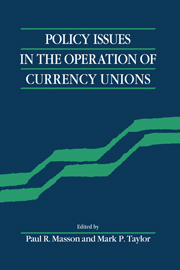Book contents
- Frontmatter
- Contents
- List of contributors
- Preface
- I Assessing the literature
- II Existing currency unions
- 2 Costs and benefits of economic and monetary union: an application to the former Soviet Union
- 3 Private capital markets and adjustment in a currency union: evidence from the United States
- 4 The economics of the CFA franc zone
- III Is Europe an optimum currency area?
- IV EMU: The road from Maastricht
- Index
2 - Costs and benefits of economic and monetary union: an application to the former Soviet Union
from II - Existing currency unions
Published online by Cambridge University Press: 04 August 2010
- Frontmatter
- Contents
- List of contributors
- Preface
- I Assessing the literature
- II Existing currency unions
- 2 Costs and benefits of economic and monetary union: an application to the former Soviet Union
- 3 Private capital markets and adjustment in a currency union: evidence from the United States
- 4 The economics of the CFA franc zone
- III Is Europe an optimum currency area?
- IV EMU: The road from Maastricht
- Index
Summary
Introduction
What keeps an “Economic Union of ex-Soviet Republics” together? Western experts (and the union government) have often argued against the dissolution of the Soviet Union on the ground that it would involve large economic costs. The purpose of this chapter is to discuss whether this is indeed true; i.e., the chapter tries to determine whether some republics would gain by leaving the Soviet (economic) Union. In analytical terms this is equivalent to asking whether economic considerations could provide a justification for keeping the Soviet Union at least an economic and monetary union.
The main result of the analysis is that the more developed republics west of the Urals would be better off outside the Soviet economic sphere. These republics would want to liberalize their economies faster, they would need to rely less on the inflation tax, and they could expect to trade more with the outside world than with the rest of the ex-Soviet Union once their economies have been liberalized.
The Commission of the European Communities (and other western economic institutions) have argued all along during the dissolution process that it would be preferable to keep the former Soviet Union an economic and monetary union (EMU). This chapter comes to a different result because it argues that competition in reform can be useful. Moreover, this chapter also considers explicitly an alternative which was neglected (perhaps for obvious political reasons) in the report of the EC Commission, namely that some republics might prefer to integrate their economies more with the emerging European economic and monetary community than with the rest of the ex-Soviet Union.
Information
- Type
- Chapter
- Information
- Policy Issues in the Operation of Currency Unions , pp. 55 - 74Publisher: Cambridge University PressPrint publication year: 1993
